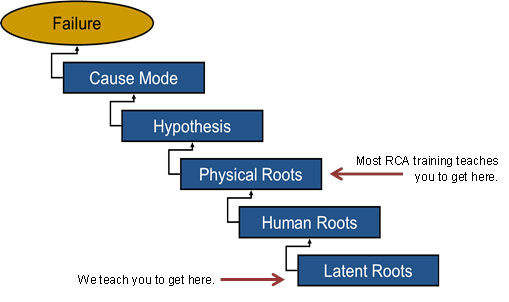Root Cause Analysis
 Facilitators Make The Difference: Featuring Mike Smith
Facilitators Make The Difference: Featuring Mike Smith
Related Resources:
 View Carl March's Video: "What RCA Tool is Best for Operators?"
View Carl March's Video: "What RCA Tool is Best for Operators?"
 Learn more about the Maintenance Management Certification Program
Learn more about the Maintenance Management Certification Program
 Learn more about the Reliability Engineering Certification Program
Learn more about the Reliability Engineering Certification Program
 Self-Paced five-minute lesson on using the A3 Problem-Solving Tool
Self-Paced five-minute lesson on using the A3 Problem-Solving Tool
Root Cause Analysis Training
Armed with what you learn in this course, you will apply a process for root cause analysis, establish a culture of continuous improvement, and create a proactive environment. Learn to ask the right questions, establish triggers that drive you to the RCA process, and perform cost-benefit analysis.
When you learn to practice true root cause analysis you are able to eliminate the latent roots and stop recurring failures once and for all. After this three-day course, you will be able to develop and implement an RCA program, thus leading your organization to reduced downtime, increased production and a more proactive culture.

Learn How To
Outline a 6-step root cause analysis process that promotes critical thinking, creative collaboration, countermeasure analysis and solution verification
Explain how a robust root cause analysis program drives continuous improvement and business results
Plan your RCA program:
a. Outline triggers for RCA efforts based on business case thinking
b. Define RCA roles and responsibilities
Define program goals, measures and standards
Select and apply a range of RCA tools to solve different problems:
a. 5-why
b. Design and application review
c. Ishikawa (fishbone)
d. Sequence of events
e. Fault tree analysis
f. Change analysis
g. Events and causal factors
h. FMEA
List RCA group facilitation best practices
Use an A3 tool to visually manage and track activities, report on and communicate RCA results
Who Should Attend
Anyone interested in acquiring or improving advanced problem solving skills will benefit from this course. Individuals responsible for continuous improvement, solving maintenance and reliability problems and preventing future occurrences of equipment and system failures, including: technicians, engineers, supervisors and managers.
Additional Information
Each course includes a comprehensive active learning manual, morning and afternoon refreshments, lunch, and the use of a fully equipped e-business center. Class hours are 8:30am to 4:30pm Tuesday through Thursday. Virtual course hours that run from 11am-5pm EST. All students completing a class at the Life Cycle Institute will receive a certificate of completion awarding 2.1 CEU’s.
For More Information on Root Cause Analysis Training
800-556-9589 | education@LCE.com
